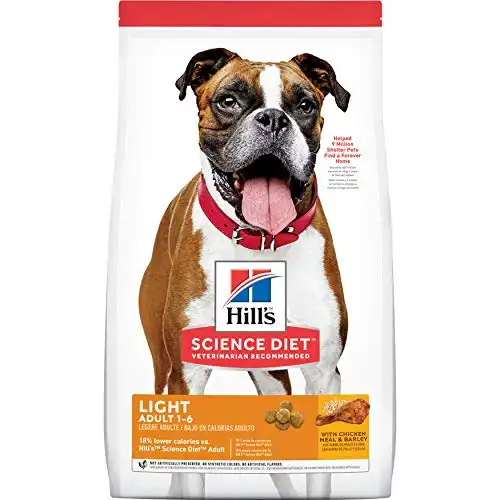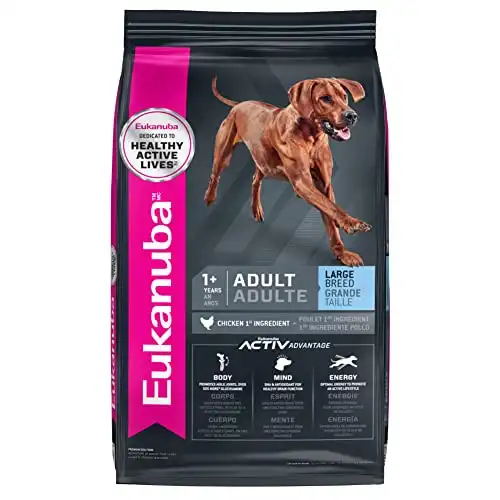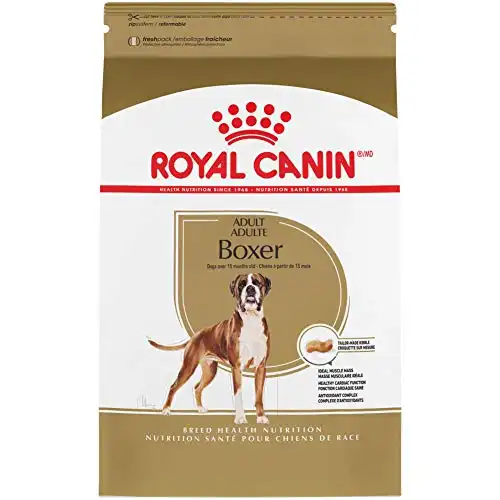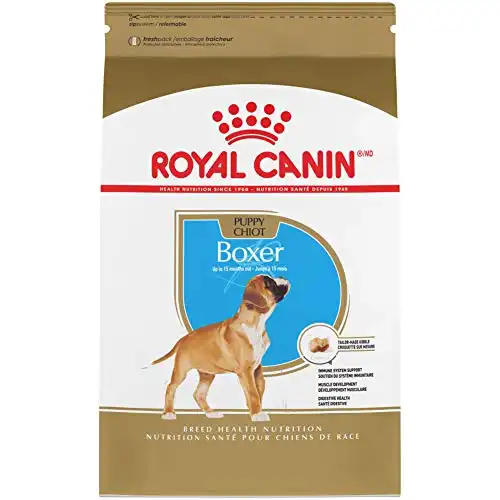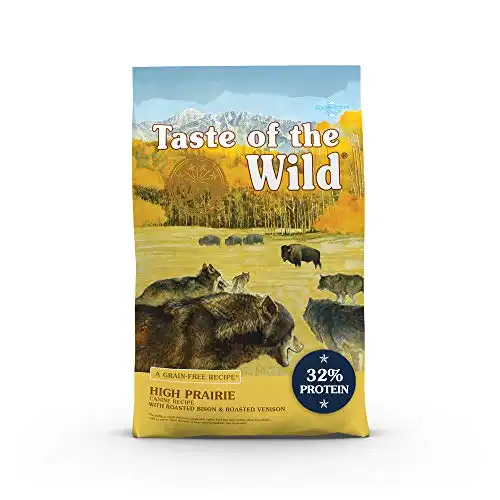Best Dog Food for Boxers [5 Best on Market]

Whether you’re a new owner to a Boxer pup or are simply looking for new dog food to satiate your pooch, you don’t want to be worrying about whether you’re feeding them the right food.
Boxers are known for being prone to allergies and can have sensitive stomachs.
Therefore, you’d rather be at ease knowing that they’re getting exactly what they need for their sensitive tummies, growth, and development.
However, with a range of dog foods readily available, how can you know which dog food is the best for your Boxer? Relax, we’ve got the answer.
We’ve compiled a list of the five best dog foods for Boxers to aid your search.
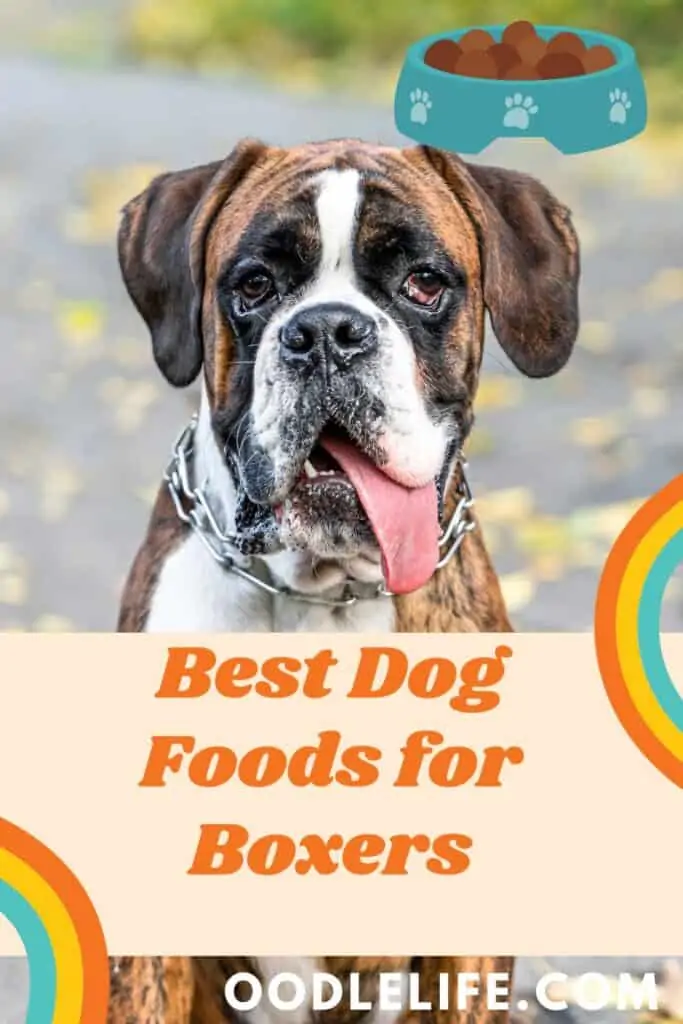
Alongside this, we’ve written a helpful buyer’s guide as well as some frequently asked questions that might have crossed your mind.
Check out our top pick below.
1. Hill’s Science Diet Dog Food, Adult, Light for Healthy Weight & Weight Management
The Hill’s Science Diet Dog Food is made from natural ingredients and high-quality protein to aid muscle growth and support for your dog.
This dog food provides L-carnitine to promote healthy body weight & heart function, with clinically proven antioxidants for a healthy immune system.
The quality protein and natural fibers help keep your dog satisfied between meals.
Pros:
- This dog food contains the optimal level of calcium for controlled bone growth: a unique developmental need of large breed puppies.
- This dog food made with natural ingredients uses DHA from fish oil to support your large dog’s eye development and brain function.
- #1 Veterinarian recommended dog food is made with a delicious chicken meal for your dog to enjoy!
Cons:
- One customer claimed that their dog was slow to adapt to the smaller kibble size.
- Adult dog food with 18% fewer calories vs. Science Diet Adult
- Provides L-carnitine to promote healthy body weight & heart function
- Quality protein and natural fibers help keep your dog satisfied between meals
- Supports healthy skin and coat with omega-6 fatty acids and vitamin E
- Made with natural ingredients
2. Eukanuba Adult Dry Dog Food Chicken – Large Breed
The Eukanuba Adult Dry Dog Food is specifically designed to be complete and balanced nutrition for large breed dogs 15 months or older, weighing over 55 pounds.
This dog food helps to keep your dog sharp and supports healthy brain function with DHA and vitamin E.
The Eukanuba dog food promotes lean muscle development and joint health in active adult dogs with a combination of animal protein, chondroitin sulfate, and glucosamine.
Pros:
- High-quality chicken is the first ingredient for a protein that powers their active day!
- This dog food helps to fuel your dog with sustenance and energy for an active lifestyle with optimal levels of fats and carbohydrates.
- The natural fiber and prebiotic blend aid gentle digestion to help keep your large breed dog feeling healthy.
Cons:
- One customer noted that this bag of dog food wasn’t as big as they were expecting, claiming that it was pricier than other alternatives.
- FOR ADULT LARGE BREED DOGS: Eukanuba Adult Large Breed Dry Dog Food is complete and balanced nutrition for large breed dogs over 15 months old and weighing over 55 lb
- MUSCLE & JOINT SUPPORT: A combination of animal protein, glucosamine, and chondroitin sulfate promotes lean muscle development and joint health in active adult dogs
- HEALTHY BRAIN FUNCTION: DHA and vitamin E support healthy brain function and help keep dogs sharp
- SUPPORTS ACTIVE ADULT DOGS: Optimal levels of fats and carbohydrates fuel an active lifestyle
- HIGH-QUALITY PROTEIN: High-quality chicken is the first ingredient for protein that powers their day

3. Royal Canin Boxer Adult Breed Specific Dry Dog Food
The Royal Canin Boxer Adult Breed Specific Dry Dog Food is designed to meet the nutritional needs of purebred Boxers 15 months and older.
This breed specific dog food maintains a Boxer’s powerful muscles and low body fat with precise protein content and L-carnitine.
The Royal Canin Boxer food promotes cardiac health with specific nutrients including taurine, EPA, and DHA.
Pros:
- Easy to eat! The exclusive tailor-made kibble design helps Boxers easily pick up and chew their food.
- This breed-specific formula features an antioxidant complex for cellular health and optimal nutrient absorption.
- Tailor-made nutrition created specifically for your purebred Boxer.
Cons:
- A few customers claimed that their dog was gassy after this food.
- FORMULATED FOR PUREBRED BOXERS: Royal Canin Boxer Adult Dry Dog Food is designed to meet the nutritional needs of purebred Boxers 15 months and older
- SPECIALIZED KIBBLE: Unique kibble shape helps Boxers easily pick up and chew their food
- MUSCLE SUPPORT: Precise protein content and L-carnitine provide muscle support and weight management
- HEART HEALTH: Specific nutrients including taurine, EPA, and DHA promote heart health
- CELLULAR HEALTH: Breed-specific formula features antioxidant complex for optimal health and nutrient absorption
4. Royal Canin Boxer Puppy Breed Specific Dry Dog Food, 30 lb. bag
The Royal Canin Boxer Puppy Breed Specific Dry Dog Food is specifically formulated and designed to meet the nutritional needs of purebred Boxers from 8 weeks to 15 months old.
This food helps to protect your puppy’s developing immune system and natural defenses with an exclusive complex of antioxidants, including vitamin E.
Supports digestion and intestinal health with high-quality proteins and prebiotics, which also helps promote optimal stool quality.
Pros:
- This food helps to maintain a Boxer’s developing muscles and low body fat with precise protein content and L-carnitine.
- Specially designed kibble for your puppy’s mouth!
- A food that you can trust, that concentrates on breed-specific needs.
Cons:
- One customer noted that the packaging of this specific puppy food could be improved, as this package is not vacuum sealed.
- FORMULATED FOR PUREBRED BOXERS: Royal Canin Boxer Puppy Dry Dog Food is designed to meet the nutritional needs of purebred Boxers 8 weeks to 15 months old
- SPECIALIZED KIBBLE: Unique kibble shape helps Boxers easily pick up and chew their food
- HEALTHY DEVELOPMENT: An exclusive complex of antioxidants, including vitamin E, helps protect puppy development of the immune system
- MUSCLE SUPPORT: Precise protein content and L-carnitine provide muscle support and weight management
- DIGESTIVE HEALTH: Supports healthy digestion and intestinal health with high-quality proteins and prebiotics, which also help promote optimal stool quality
5. Taste of the Wild Dry Dog Food With Roasted Bison And Roasted Venison
The Taste of the Wild Dry Dog Food With Roasted Bison and Roasted Venison is made with real protein as the #1 ingredient with optimal amino acid profile & protein rich for lean, strong muscles.
No artificial flavors, colors, or preservatives! The natural ingredients are from trusted, sustainable sources around the world.
This dry dog food is highly digestible, with species-specific proprietary probiotics and 32% protein per portion!
Pros:
- This nutrient-rich, grain-free recipe with sweet potatoes and peas provides highly digestible energy for your active dog.
- Supplemented with vegetables and fruits to maintain overall vitality and to help promote a healthy lifestyle.
- Each pound of this food provides 80 million live, active cultures that help support healthy digestive and immune systems.
Cons:
- A couple of customers noted that their dogs struggled with the switch to this specific dog food.
- Taste of the Wild High Prairie with ROASTED BISON and VENISON dry dog food; REAL MEAT is the #1 ingredient; high-protein (32%) to help support bones, joints and LEAN, STRONG MUSCLES
- Nutrient-rich and provides the energy to thrive; vitamins and minerals from FRUITS and SUPERFOODS; omega fatty acids for healthy SKIN and COAT
- Each serving includes species-specific K9 Strain PROPRIETARY PROBIOTICS - plus antioxidants and prebiotics - to help support healthy digestion, IMMUNE system and overall health and wellness
- FAMILY-OWNED and MADE in the USA using quality ingredients from trusted domestic and global sources
Best Dog Food for Boxers Buyer’s Guide
There are a few things to consider when it comes to buying dog food for boxers, but it mainly comes down to the fact it will need to have a high protein content, have special micro-nutrients, and should contain an average to high-calorie content.

You want to ensure that your Boxer gets all the right nutrients, so don’t be tempted to buy your pooch a cheaper alternative.
If you cut corners by buying a lower quality food, it could be that your Boxer won’t be getting the same balance of nutrients that a breed-specific food provides.
More importantly, cheaper alternatives that are high in filler ingredients could make your dog sick, as they are not as easily digestible as the high-quality, natural ingredients that your dog needs to thrive.
Check out the features below before clicking ‘buy’.
Protein
Similarly to other larger breed dogs, Boxers require a lot of protein in their diet.
A high protein diet is fundamental for fueling their growth and helping maintain their muscles. That need is heightened with Boxers, as they have a particularly muscular build that they need to maintain.
Animal protein is essential for Boxers, although protein can also be obtained from plants.

However, many amino acids are only present in animal protein, so it’s vital that you choose a dog food that reflects their needs for a high-protein diet.
In addition, animal protein is much easier for dogs to digest than protein from plants.
You’ll want to ensure that the number one ingredient in the dog food that you choose for your Boxer is protein or protein meal, such as chicken, turkey, beef, or salmon.
Natural ingredients are generally considered to be better and easily digestible for your pooch than food that has artificial flavor and colorings.
You also want to avoid foods that are packed with fillers. Generally speaking, the term ‘fillers’ refers to unhealthy ingredients that hold little to no nutritional value for your pooch.
Calcium, Taurine, L-carnitine
Something important to take into account when buying dog food for your boxer is that they need specific micronutrients such as calcium, taurine, and L-carnitine.
Even though they are called micronutrients, and are therefore only needed in small amounts, they play a vital part in keeping your dog healthy.

Calcium is fundamental for Boxer’s to maintain their strong bones and teeth, as well as facilitating muscle contractions. Calcium can also affect heart health, so it is important that your dog is getting enough calcium.
Taurine is an amino acid that is essential for functioning the organs, including the brain, heart and eyes.
A taurine deficiency can significantly affect those organs and, in severe cases, lead to what is known as dilated cardiomyopathy (enlarged heart).
Boxers require taurine in their diet for optimum brain development and for their heart health, which you will find in high quality, high protein dog foods.
L-carnitine’s primary responsibility as an amino acid is to transport fatty acids where they are processed for energy utilization. It also helps improve blood flow by dilating blood vessels through synthesizing nitric oxide.
As a result, you need to make sure that the food that you choose is dog food with the correct nutrients to maintain your dog’s health and so that they can thrive!
Feeding Schedule
If you’re a new Boxer owner, something you’ll need to consider is making a feeding schedule for your dog.
However, before you do this it is important to note that you should always consult with your veterinarian to ensure that you’re feeding your dog the appropriate amount.
Generally speaking, Boxer puppies will need to be fed 3-4 times a day, but this may differ depending on your specific dog, especially if it has any health issues.
The amount you feed your Boxer will depend on its age, any existing medical conditions, stage of development, and their activity level will play a role too.
It is crucial, however, that these meals are properly spread out throughout the day.
Puppies are highly energetic and will require more protein than an elderly Boxer that has become less active as they’ve grown older.
Taking all of this into account, working with your veterinarian is the safest option to figure out the best feeding schedule for your dog.
They’ll be able to offer you advice on your initial feeding schedule and then can help you alter it as your dog grows, and is generally the safest option to wholeheartedly know that your dog is getting the right amount of nutrients.
The most important thing to remember is that consistency is key when it comes to a feeding schedule for your Boxer.
Hydration – Dry Vs Wet Dog Food
When it comes to buying dog food for your boxer, something important to consider is the hydration that their food will provide.
Generally speaking, dry kibble does not offer the same level of hydration as wet dog food does.
Whereas wet food is generally made up of 80% water, dry kibble usually sits around 20%.
As a result, if you pick a dry kibble, you will also need to monitor how much your Boxer is drinking throughout the day alongside their meals.
Boxers can be prone to Brachycephalic Obstructive Airway Disease. BOAS is a combination of upper airway problems seen in dogs that are bred to have short noses and high domed foreheads.
This is important to monitor closely, and you’ll need to ensure that your pooch is getting enough water throughout the day so that they can regulate their temperature properly.
However, dry kibble can significantly help with your dog’s dental health, as crunching dry kibble will help them to keep any plaque build-up at bay.
Alongside this, there is much more variation to choose from when it comes to dry kibble as opposed to wet food. As a result, dry food is generally perceived to be better to give your dog on a daily basis.
If you find that your Boxer is fussy and won’t eat the dry kibble alone, you could try incorporating wet food into their food to make it more palatable for them.
The aromas will hopefully tempt them to the bowl and add something new for them to try.
Health Issues
Something incredibly essential to consider is any medical conditions that your Boxer might have or might develop in the future, of which their diet plays an important role.
A few common health issues in Boxers are listed below.
Boxers can be prone to heart issues. A common heart problem seen in Boxers is Arrhythmogenic right ventricular cardiomyopathy, or as it’s otherwise known, Boxer cardiomyopathy.
If your Boxer is struggling with heart issues, you may need to alter their diet in accordance with this health issue.
Boxers are also at an increased risk of obesity. It’s fundamental that you ensure that you are feeding your Boxer high-quality food as well as ensuring that they get the right amount of daily exercise as part of their healthy, balanced diet.
A serious health issue that is prevalent within Boxers is bloating. This is where the stomach fills with gas and then twists, obstructing proper blood flow.
As a result, you will need to find a food that is suitable for your Boxer’s stomach, as bloating can be fatal if it’s not treated. Slow feed bowls can also help combat this issue, as they help your dog from wolfing their food down too quickly.
Boxers can be prone to developing eye problems, such as corneal ulcers, due to the shape of their skulls and prominence of the eyes, so a food that has the micronutrient taurine is important in their diet.
This breed is also prone to developing allergies, such as food allergies, skin allergies, and gas can also be a problem in Boxers.
Consult a Veterinarian
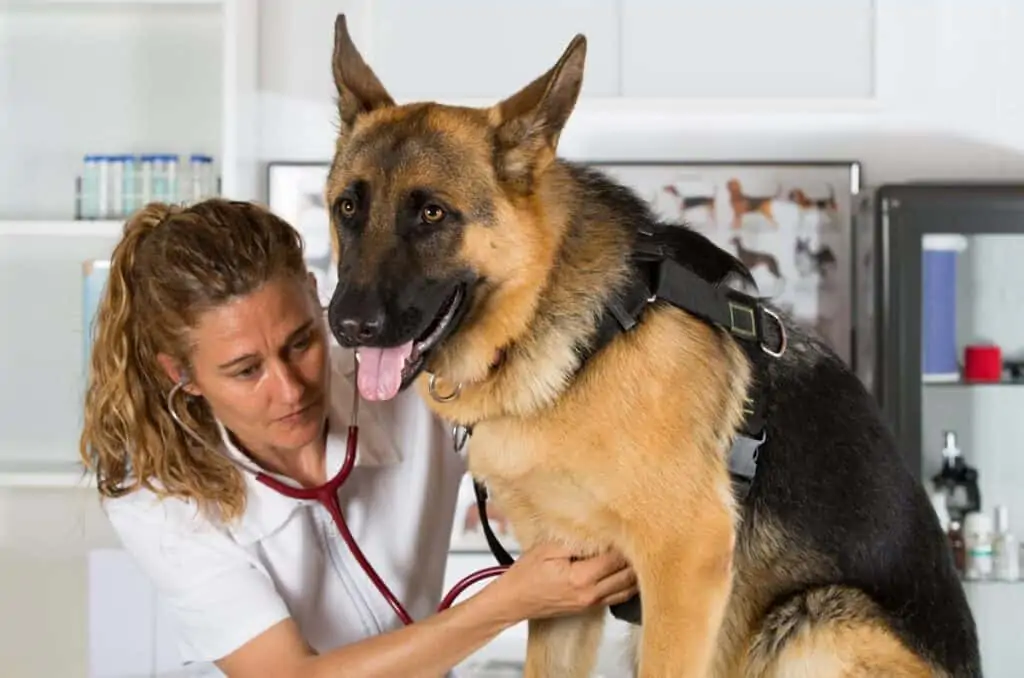
It is important to note that before making any purchases, or making a drastic change to your dog’s diet, you should consult a veterinarian.
This is especially important if you’re new to owning a Boxer puppy, as you need to manage their food properly as they grow rapidly in the first 15 months.
A veterinarian will be able to offer you advice on your specific breed, tell you which foods or ingredients to avoid buying, and what to look out for when it comes to allergic reactions.
Boxers are known for having sensitive stomachs, so if you’re considering your Boxer’s diet, it is important that you do this gradually and slowly.
This will give your dog the chance to adapt to their new diet and give you the opportunity to notice if anything is wrong, such as a food or skin allergy as a result of the food that you’ve chosen.
Patience is key in this situation! After all, we all want the best for our pets so that they are as happy and as healthy as possible.
Frequently Asked Questions
What is the best dog food for Boxers?
The best dog food for Boxers is likely to change depending on the dog, however, there are some important factors that you should look for when choosing a dog food.
Namely, your Boxer will need a high-protein diet to help maintain their muscle development.
The dog food that you choose should also contain essential nutrients such as vitamins and minerals, and the micronutrients we mentioned such as calcium, taurine, and L-carnitine.
If your Boxer has any health issues, you should also take their medical condition into account when buying the right type of food for them.
For instance, if your dog is obsese or has diabetes, you will need to find a food that specifically helps manage those conditions.
How much should I feed my Boxer?
How much you feed your Boxer, and how often you feed them, will largely depend on their age.
Boxer puppies between 2 – 6 months old should be eating around 320 grams of kibble divided into four different meals.
From 6 – 12 months, you can alter this amount into two meals a day, but as puppies, they need to be fed little and often to sustain their energy.
However, this amount will need to be altered as they grow older. If in doubt about how much to feed your dog, you should always check with your vet on the amount of food and how many times a day you should be feeding them.
